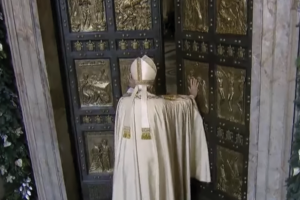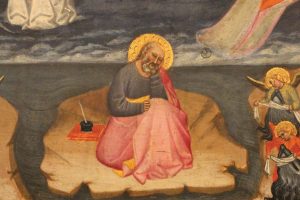We need the example of this woman who tried to live the gospel in the modern world.
 Imagine this: A grumpy associate pastor rushes into the sacristy to prepare for the early Mass. This guy loves liturgy but wonders why those little old ladies have to whisper their own prayers while he's presiding. He loves the majesty of Catholic teaching, yet refuses to answer the rectory door after 6 p.m. He gives avid assent to most papal teachings but votes for political candidates who love to rattle their sabers and threaten to "nuke our enemies back to the Stone Age." He always manages to look the other way when the surly head usher escorts unsightly and repugnant street people out the back door of church-"thank God!"-before the wedding party arrives.
Imagine this: A grumpy associate pastor rushes into the sacristy to prepare for the early Mass. This guy loves liturgy but wonders why those little old ladies have to whisper their own prayers while he's presiding. He loves the majesty of Catholic teaching, yet refuses to answer the rectory door after 6 p.m. He gives avid assent to most papal teachings but votes for political candidates who love to rattle their sabers and threaten to "nuke our enemies back to the Stone Age." He always manages to look the other way when the surly head usher escorts unsightly and repugnant street people out the back door of church-"thank God!"-before the wedding party arrives.
And so he turns to the ordo, the book that tells him whose feast we are observing today. He wonders whose example of holiness we are called upon to celebrate and imitate and he reads-gasp!-Saint Dorothy Day.
I long for that day to become a reality for our church. I may be more like that fictional grumpy priest than I care to admit, and I need all the help I can get to change my ways. I am confident that Saint Dorothy Day could help.
In 1983 Father Henry Fehren wrote in Salt magazine (published, like this magazine, by Claretian Publications): "Certainly a saint for our time and place is Dorothy Day. Let's canonize her now."
Intervening years have further convinced me that we need this cofounder of the Catholic Worker movement in our calendar of saints. My colleagues and I were delighted when, shortly before his death, Cardinal John O'Connor announced that Day's cause had officially been opened in Rome.
The People of God can benefit from the example of her personal holiness. Steeped in prayer and the sacraments, she followed a lifelong spiritual path of conversion and devotion to Christ, whose face she found in the people she met on Mott Street. She approached her spiritual practices with a ravenous hunger that speaks to the broad spiritual hunger in our world. Hers was a tenacious spirituality-like grass that grows through cracks in a city sidewalk. It was both gloriously transcendent and yet decidedly incarnational.
We also need Dorothy's love of the poor. She took an idealist's passion for humanity and-following Saint Therese of Lisieux's Little Way-let it blossom into a tangible love for the poor people she met, one person at a time. Dorothy Day worked society's margins to bring those hanging perilously close to the edge into the center of our consciousness. She not only fed hungry people, she also condemned "this filthy, rotten system," the scandalous maldistribution of society's resources that produces their deprivation and misery. And she found the source of this truth not in Marx but in the gospel.
We need her example of radical commitment to gospel nonviolence. Our recent century, the bloodiest in history, should have convinced all civilized people of the folly of armed conflict as a way to solve our problems. Yet we continue to embrace this folly as the only available brand of wisdom. We have an opportunity to set another course, to hone other skills, to build better relationships, and to wean ourselves away from the false security provided by nuclear weapons-in other words: to study war no more. Will we have the courage? Will we summon the faith? Can we find the creativity necessary to even imagine such a future? Saint Dorothy Day can show us a way.
And we need Saint Dorothy Day to underscore that the real role of the laity is to be saints in the world right where we live. Bishops can make pronouncements, but it will take the laity to transform the world. Her example and influence can help us avoid getting absorbed in intramural squabbles with self preservation of the organization as our only goal. She can help us see that our mission is to create a banquet at which everyone will eat.
Some devotees have argued that Day would reject the notion of her canonization. She once said, "Don't call me a saint-I don't want to be dismissed that easily." Her biographer and friend Jim Forest responds, "This has to be understood in context. It irritated her that she was sometimes introduced to audiences as someone for whom walking on water would be no problem. Her reverence for saints was profound. She believed there was nothing more urgent than to try to be the saint God intended."
Day was also known to ask, "Where were the saints to try to change the social order, not just to minister to the slaves, but to do away with slavery?"
I think it's clear that she-with courage, diligence, and grace-became an answer to her own most pertinent question.
This article first appeared in the July 2000 issue of U.S. Catholic












Add comment